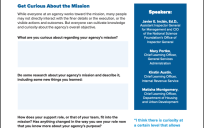Whether due to a mistake or just bad luck, we’ve all experienced a career setback or two. Some mishaps may be more damaging to your reputation than others. But a misstep at your last job doesn’t have to invalidate your impressive career experience. If you think your mistakes make you unemployable, we’re here to prove you wrong. Here are a few ways to overcome serious career setbacks.

Bad Recommendations
If you had a rocky relationship with your former supervisor, you may feel anxious about applying for jobs that require recommendations. In fact, you may avoid them altogether. But there are a couple of things you can do to solve this problem.
- Talk it out. If you’re worried about whether your tumultuous relationship with your last boss will affect your ability to get a job, the only way to ease that worry is to have a conversation with them. Yes, these conversations can be uncomfortable. Especially if they tell you they’re not confident enough in your performance to give you a positive recommendation. But, it is better to know for sure that you cannot rely on that person for a recommendation than to list their name and hope for the best. Before walking into the meeting, prepare yourself for bad news and don’t force a positive result. You can always ask someone else to fill the reference spot.
- Find a new reference. If you and your boss never saw eye-to-eye, the best option is to avoid listing them as a reference all together. If you worked closely with someone else at the organization and you feel that they have a decent understanding of your work style and accomplishments, list them as a reference instead. Before you send their name in, check in with your potential reference to make sure you’re on a similar page about the work you’ve done for them. It is also a common courtesy to give your references the rundown about the position you are applying for so that their recommendation can apply to the new position.
Getting Fired
Let’s face it, getting fired from a job is a career nightmare for many. You may think that there’s no way to come back, but most people bounce back after losing a job. With these tips, you can too.
- Exit gracefully. It’s normal to feel down and angry if you get fired. However, you may still need to list your former position on your resume so you want to make sure that you leave gracefully. Before you leave, reach out to your colleagues and supervisors so you can keep them in your network. Ask them if they will endorse you for the skills you applied and learned during your time with the organization. Even though you were let go, it does not necessarily mean you have to wipe the entire experience from your career history. If your firing caused controversy at your organization, a simple thank you will suffice.
- Take advantage of your free time. Being unemployed can be stressful, scary and, quite honestly, boring. Unfortunately, we never know how long a job search will take. So, instead of spending all of your free time applying to new jobs and catching up on Netflix, use that extra time to increase your skillset before you take on a new position. There are many ways to increase your skillset whether it’s pursuing a certification or taking a class at a local university. Not only does this show potential employers that you can take initiative and turn a less than ideal situation into a positive, it can also make you more qualified for future positions.
- Choose your words wisely. Sometimes full honesty is not the best policy. When you’re finally ready to apply to jobs, it’s important to not overshare about your last position. Instead of explaining the explicit reason for your firing, you can chalk it up to downsizing, a difference in direction or you can cite the departure as a mutual decision. Lastly, talk about what you learned from the experience with potential employers so you can demonstrate that you are able to grow and take action in unideal situations. Put yourself in an employer’s shoes and think about what you would want to hear from a potential employee.
Bad Performance
Whether due to stress or personal issues, we’ve all been disappointed in our work performance. Instead of brushing over it, here are a few ways you can take control and steer your career in the right direction.
- Be communicative. In the workplace, communication is key. Instead of waiting for your supervisor to point out your bad performance, reach out to them first and let them know that you would like to improve. You know how to increase your productivity so when you reach out, be sure to come to the meeting prepared with solutions. Most likely, your boss will appreciate your ability to be introspective and take initiative. If you feel like your poor performance inconvenienced your team members, feel free to reach out to them too. People appreciate apologies and if you recognize that you let others down, they will be more likely to trust you in the future.
- Move forward. When you make a mistake at work, the only thing you can do is to not let your past performance affect your future assignments. While it’s important to figure out how to prevent making the same mistakes, dwelling on the issue and how it negatively impacted the organization is not helpful for your productivity. Remember all the positive things you’ve done in your career and that you are capable of bigger and better. Have a conversation with your boss about ways you can move forward.
- Take a step back. If all else fails, there may be another reason your performance is suffering. If you are dealing with personal problems outside of work or you’re feeling stressed, it’s more than okay to take a few days off to re-center yourself. Taking some time to yourself will allow you to recharge so you’re ready to take on anything and everything that comes your way when you return to the office.
This post is part of GovLoop’s millennial blog series, First 5





Great advice. Thanks for sharing, Danielle!